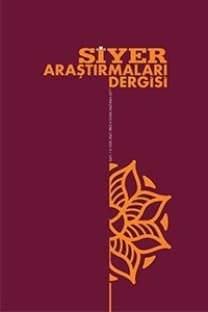Siyer-i Nebî İslâm Tasvir Sanatında Hz. Muhammed’in Hayatı” Adlı Eser Üzerine Bir İnceleme
İslam’da tasvirin câiz olup olmadığı, nelerin resmedilip nelerin resmedilemeyeceği meselesi âlimler tarafından uzun yıllardır tartışılagelmiş fakat üzerinde ittifak edilememiş bir konudur. Kimi âlimler yasağın sadece mücessem varlıkları kapsadığını söylerken, kimi âlimler ise mürtesem varlıkları da kapsadığı görüşünü benimsemiştir. Bu hususta en önemli ve çok tartışılan kısım, Hz. Peygamber’in sûretinin resmedilip resmedilemeyeceğidir. Tasvir konusunda bir ittifak bulunmadığı için kimi zaman nakkaşlar tarafından Hz. Muhammed’in yüzü açık bir şekilde tasvir edilirken, bazı dönemlerde ise nikâblı bir şekilde tasvir edilmiştir. Hz. Peygamber’in hayatına dair bazı olayların tasvirini çeşitli tarih kitaplarında görmekteyiz. Fakat bunlar genellikle birkaç sayfadan oluşan, kronolojik olmayan hatta bazen kurmaca olayların tasvirleridir.
Kronolojik bir sıra takip edilerek Hz. Peygamber’in hayatının anlatıldığı ilk örnek, Mustafa ed-Darîr tarafından kaleme alınan Siyer-i Nebî kitabıdır. Kitabın Osmanlı döneminde tasvirli nüshaları oluşturulmuş, oluşturulan bu eserler Prof. Dr. Zeren Tanındı tarafından incelenmiştir. Bu çalışmada, Hürriyet Vakfı Yayınları tarafından “Siyer-i Nebî İslam Tasvir Sanatında Hz. Muhammed’in Hayatı” adı ile 1984 yılında neşredilen eser tanıtılacaktır.
Anahtar Kelimeler:
Tasvir, Şemâil, Mustafa b. Yusuf b. Ömer ed’Darîr el-Erzenü’r-Rûmî, Siyer-i Nebî, Zeren Tanındı
A Review on “Siyer-i Nebî İslâm Tasvir Sanatında Hz. Muhammed’in Hayatı”
The issue of whether or not depiction is permissible in Islam and what can be depicted and what cannot has been debated by religious scholars for many years, but has not reached consensus. Some religious scholars argue that the prohibition only covers tangible objects, while others argue that the depicted objects are also involveled. The most important and controversial part of thiâs is whether or not the Prophet Muhammad's semblance can be depicted. Since there is no consensus on the depiction of Muhammad, his face is sometimes depicted with a veil and other times without one. In various history books, We see descriptions of some events in the life of Prophet Muhammad. However, these are generally depictions of events that are not chronological, consisting of only a few pages. Sometimes fictional events have also been depicted. The first example of a narrative of the life of the Prophet Muhammad that follows a chronological order is the book Siyer-i Nebî, written by Mustafa ed-Darîr. Illustrated copies of this book were created during the Ottoman period. These illustrated copies were also examined by Prof. Dr. Zeren Tanındı. In this study, the work written by Zeren Tanındı and published by the Hürriyet Foundation under the title "Siyer-i Nebî: The Life of Prophet Muhammad in Islamic Illustrative Art" in 1984 will be introduced.
Keywords:
Tasvir, Şemâil, Mustafa b. Yusuf b. Ömer ed’Darîr el-Erzenü’r-Rûmî, Siyer-i Nebî, Zeren Tanındı,
- ISSN: 2547-9822
- Başlangıç: 2017
- Yayıncı: Siyer Yayınları
Sayıdaki Diğer Makaleler
İbn Hacer’in el-İsâbe fî Temyîzi’s-sahâbe İsimli Eserinde İbn Kāni‘ye Eleştirileri
Şâir Bir Sahâbî: Abbâs b. Mirdâs es-Sülemî
Zekât Memuru Bir Sahâbî Abbâd b. Bişr b. Abdi’l-Eşhel
Sahâbenin İctihad ve Hataları Karşısında Nebevî Tutum
Siyer-i Nebî İslâm Tasvir Sanatında Hz. Muhammed’in Hayatı” Adlı Eser Üzerine Bir İnceleme
